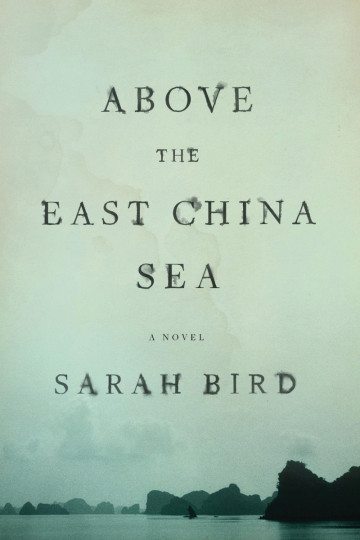
The Compassionate Imagination of Sarah Bird

A version of this story ran in the June 2014 issue.
Above: Sarah Bird
When I first began Sarah Bird’s lyrical new novel, Above the East China Sea, I was struck by the timeliness of its theme. The “double colonization” of Okinawa was recently front-page news as the U.S. and Japan dickered over the best spot to build a new U.S. air base on this Japanese prefecture—a term with troubling imperialist implications.
But then I realized that the exploitation of Okinawans has been a perennial topic since at least 1879, when Japan annexed the Ryukyu archipelago. Indeed, Okinawa seems a lightning rod for tragedy and exploitation. During World War II, Bird writes, “more people were killed [there] than at Hiroshima and Nagasaki combined.”
So, to the many Okinawans who don’t identify as Japanese, and who feel that their small, long-suffering land (the poorest province in Japan) has too long served as a pawn in the petty squabbles of First World powers, negotiations over a new U.S. air base are galling. Especially given the abuses so often suffered by impoverished “host” nations who strain under, to quote Martin Fackler’s recent New York Times article on the subject, an “unfairly onerous American base presence.” In Okinawa, which hosts 75 percent of the U.S. military bases in Japan, the disadvantages of this arrangement are legion.
According to a recent article by Australian journalist Matthew Carney, Okinawans are “sick of the noise, the military accidents, and the crime U.S. servicemen bring”—the most infamous example being the 1995 rape of a 12-year-old girl by three U.S. soldiers (one of them from Woodville, Texas). But that’s not the only variety of hardship inflicted upon Okinawans by the U.S. and Japan. Not long ago, Carney writes, locals found 83 barrels of toxic waste beneath a soccer field, a lethal memento of the U.S. stockpile of Agent Orange on the island during the Vietnam War, and just one of dozens of toxic waste sites discovered by Okinawans over the past decades. Under the scandalous terms of the U.S. partnership with Japan, Carney writes, our government is not legally responsible for cleaning up or compensating for such pollution.
This sad state of affairs—imperial power’s refusal to clean up its messes—is really what Bird’s latest book is all about. Above the East China Sea is the story of Luz James, a 21st-century Air Force brat whose mother is stationed at Okinawa’s Kadena Air Base. Luz (whose name tellingly suggests both loss and light) is despairing over the recent death of her sister, Codie, killed in the line of duty in Afghanistan. The details of Codie’s death are hazy—it’s even possible she died by her own hand. Luz is devastated and contemplating suicide herself. (Here, too, Bird’s fiction mirrors front-page tragedy. Last Veterans Day, Amy Goodman reported on Democracy Now! that suicide among U.S. military personnel and veterans has achieved epidemic proportions—22 U.S. veterans now commit suicide every day, and more active U.S. servicemen and women killed themselves in 2012 than were killed by “the enemy.”)

By Sarah Bird
KNOPF
336 pages; $25.95 KNOPF
The circumstances of Luz’s suffering, then, would be all too common on any military base. But in Okinawa, where thousands committed suicide in 1945 to escape Operation Iceberg, the deadliest battle waged in World War II’s Pacific theater, it possesses an especially dreadful resonance.
Okinawa’s brave and heartbreaking history is embodied by Above the East China Sea’s other principal character, Tamiko, a pregnant 15-year-old Okinawan living in the midst of Operation Iceberg, for whom “not a single leaf of green hope has survived.” Like Luz, Tamiko is weighing the option of suicide, due largely to the loss of a beloved sister ripped from her during battle. Almost immediately, despite the decades separating them, Luz and Tamiko’s storylines converge. Over the three days of Obon—a traditional Buddhist holiday during which the dead are granted free rein over the earth—hopelessness drives both these young women outward, into the arms of their families, and inward, toward a spiritual awakening that ultimately provides their salvation. By story’s end, both girls, one living and one dead, have found peace, if not closure—closure being an exceedingly American, 21st-century concept that most Okinawans would find distastefully foreign anyway. In the heightened metaphysical reality of Bird’s novel, humans and ghosts walk among each other, and mortality proves no hindrance to resolving family dramas. In fact, Okinawans’ relationship to death, at least as presented by Bird, seems somewhat offhand, as though the great cosmic divide is actually a very thin veil between our world and the next. This aspect of the girls’ shared experience is reminiscent of Faulkner’s great line, “The past is never dead. It’s not even past.”
Like Faulkner, Bird is a writer whose métier is the American South, though, also like Faulkner, her writing possesses an expansive worldview. To my mind, Bird is the finest living Texas novelist, and Above the East China Sea showcases all of her gifts in spades—her unmistakable voice displays warmth, wit, and that rare variety of irreverence that possesses real heart. These traits were most lately exhibited in The Gap Year, a charming 2012 novel about the chasm of misunderstanding and devotion that yawns between mothers and daughters. That book features (indeed, many of Bird’s books feature) seemingly thick-skinned youths who’re dying (sometimes literally) for connection. In The Gap Year, that longing lassoes Austin’s foodie culture and a cult resembling Scientology into its narrative.
This is not, by the way, an unlikely pairing in Bird’s universe—no more unlikely than suicide and Oban. But then, her work has always displayed a seriousness that critics sometimes overlook in the face of her humor. She is, it seems to me, one of those artists whose reputation has been hamstrung by her ability, appreciated more for her lively, hilarious prose than for her depth and intellect. This is a common plight of funny writers. Bird’s work sells briskly and is praised widely by critics, but hers are not the sort of books often shortlisted for national prizes. It’s a phenomenon that even P.G. Wodehouse, surely one of the ablest (and funniest) practitioners of the language, bemoaned, noting that, regardless of their quality, his books were “looked down upon by the intelligentsia and sneered at” for being humorous.
Bird is a military brat herself, and one sometimes supposes that her remarkable range—she’s written, after all, such diverse novels as The Yokota Officers Club and The Flamenco Academy—was made possible in part by skills she must have developed as a wayfaring child: to blend in and observe. There is a suggestive passage in Above the East China Sea in which Luz addresses the social pitfalls of being a military brat: “There’s a myth that, because we move so much, military kids are geniuses at making friends In the end, though, what all military kids are truly gifted at, the social skill we’ve mastered better than any other, is unmaking friends. We’re geniuses at leaving people behind.”
One can observe this knack for detachment in Luz’s behavior, as she withdraws from the world in order to keep from being hurt. And I wonder if this habit of constantly looking over one’s shoulder, of feeling a bit detached from one’s own circumstance, is an experience common to many great writers. “We require nothing,” Luz says of her military kin. “Not even real roots. We’re air ferns.”
One senses that Bird’s itinerant background helped create a capacity for identifying with the suffering of all sorts of characters, from the spoiled socialites of How Perfect Is That to the loners and refugees of Above the East China Sea. She’s as adept at crafting social satire set in Austin as she is at inventing historical drama in Okinawa. The experience of this author’s lifetime seems to have inspired a kind of free-floating compassion that isn’t reliant upon any specific geography.
And so it’s appropriate that by the conclusion of Bird’s latest novel, such anchoring concepts as family and home have been challenged and unmoored. Returning to the air base from a day spent paying homage to a landscape of unspeakable pain and hardship, “the red glow from Kadena’s twenty-four thousand feet of runways feels,” to Luz, “like a fire burning in the hearth, welcoming [her] home.” And though she isn’t blind to the moral complexities of this sensation—of her attachment to this seat of imperialist injustice and domination—she wants “the coming-home feeling to go on” forever.


